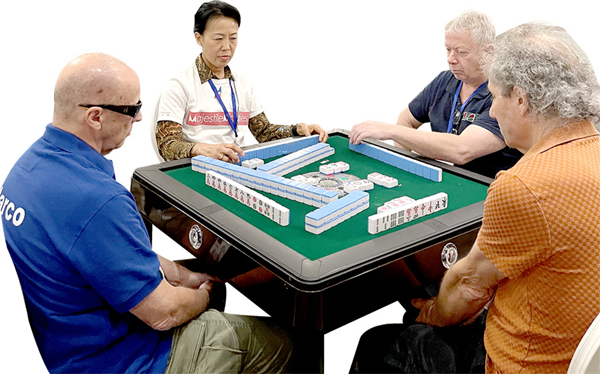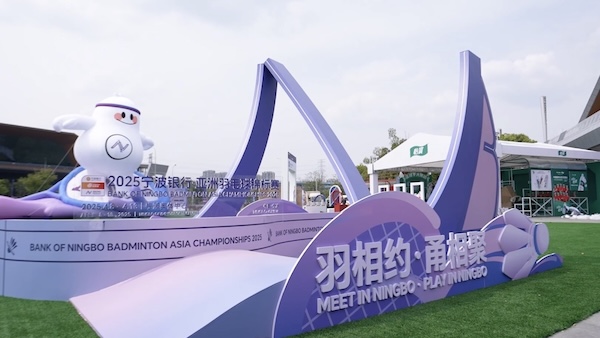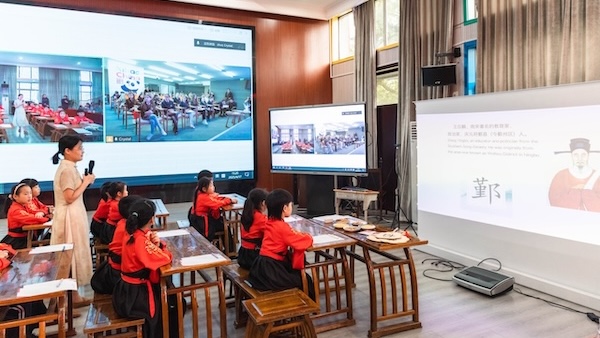Mahjong extends global reach as Canada hosts world championship

Players compete during the 7th World Mahjong Championship in Mississauga, Canada, on Oct 12. [Photo/China Daily]
Not even a painful knee could deter 83-year-old Deng Wenfeng from competing in the 7th World Mahjong Championship, which was held recently in North America for the first time.
Deng was the oldest player at the tournament, where she was affectionately called "Mahjong Grandma", and drew the attention of many contestants and spectators.
The championship was held in Mississauga, Canada, from Oct 11 to 14. Hosted by the World Mahjong Organization and organized by the Canada MCR(mahjong competition rules) Sports Association, the event brought together mahjong masters from around the world.
Mahjong is a game that originated in China in the 19th century. Typically, it is played by four people with 144 tiles. The tiles are drawn and discarded until one player gets a winning hand.
Deng even postponed knee surgery to participate.
"This is my third time participating in a World Mahjong Championship. I will never miss the opportunity to participate in the competition," she said with a smile. She took painkillers to ease the pain in her knee, and played her games standing on crutches.
Part of daily life
Born in Wuhan, Hubei province, Deng began playing mahjong in the 1960s during her lunch breaks.
"At the time, I played mahjong just for fun," she recalled. After moving to Canada in 2011 to be with her daughter, she wasted little time becoming part of the local mahjong scene. "I play mahjong every day; it has become an integral part of my daily life," she said.
Deng does not shy away from competing against younger players, but concedes, they "are faster, their mindsets are sharper, and their strategies sharper".
She said she enjoys the challenge. "I like playing against young people. I am not sad when I don't win," she said. "I just enjoy the game and try to do my best."
For Deng, mahjong is about friendship, quick thinking and clarity of mind. "It keeps me thinking fast and reacting quickly. You've got to pay attention to the game's changes, that is, observe the tiles, master your hand and predict your opponent's move," she explained.
Over the years, mahjong has helped her build a strong group of friends in Canada, and also in China when she visits. Her most cherished championship memories, however, have nothing to do with winning or losing. Two memories stand out in particular.
The first is the friendship she developed with a Japanese player who after each match came over to her, hugged her and shouted excitedly: "See you tomorrow."
The second was her chemistry with a young Canadian competitor. Throughout the championships, they cheered each other on.
Although Deng finished 119th with 14 points, she was still happy. "Winning or losing doesn't matter. At my age, just being here is an achievement," she said.
"We wanted to bring mahjong to North America because there are so many mahjong fans here, especially among the Chinese diaspora," Max Ma, chairman of the Canada MCR Sports Association, told China Daily. "Mahjong has been highly recognized for many years in Europe and Asia. This is our opportunity to expand its popularity here."
Fierce competition
The bid by Ma and his team to host the event was ultimately successful over several other countries, including Japan.
"We promised to make this the best championship," Ma explained.
This year's championship attracted 160 competitors from 17 countries and regions, but China, the traditional mahjong powerhouse, had to withdraw because of visa issues. The competition was still fierce, with Canadian players capturing two of the top three places.
Team Canada featured champion Gao Erfei and the third-place finisher, Lin Hai. Gao said mahjong has become an indispensable part of his life, although he just started playing international standard mahjong last year.
"I've been playing mahjong for over 30 years," said Gao. "But international standard mahjong is different from traditional mahjong. It's more of a mental game, which attracted me a lot."
This victory surprised Gao, who admitted that he depended more on luck than preparation. "I didn't do anything special to prepare," he said.
Gao's calm demeanor served him well.
"I always stay calm," he said. "Even if I got penalized in a round, I was able to compose myself and continue to play. That's the nature of the game; there are wins and losses."
Gao said that playing mahjong at a competitive level requires mental sharpness and physical stamina.
"You need brainpower and stamina to compete, especially in long matches," he said.
Lin agreed that international standard mahjong is complicated. "I have been playing mahjong since college, but only got into international standard mahjong about a decade ago," he said.
He said he found the challenges of the international rules more appealing than traditional mahjong.
"There's a lot of calculation involved, and that's what makes it fun," he said.
Lin did well in the early rounds, but things got tougher toward the end of the championship. "My luck turned in the eighth and ninth rounds," he explained.
"There were problems with the mahjong table, and we had to change tables several times. That disrupted my rhythm," Lin said.
International appeal
Alex Levin, a 59-year-old software developer and mahjong enthusiast who was born in Russia and has been living in Canada for more than 20 years, was part of the Canadian team.
"Mahjong has been a big part of my life for the last eight years," said Levin, adding that his love of the game began on a family vacation in 2016. His introduction to mahjong was at a ski resort, where he noticed people playing in a restaurant.
Levin and his family were impressed by the colorful tiles and bought a mahjong set to teach themselves how to play. But Levin soon realized that learning the game was not that easy.
"We opened the box and saw the rules, but couldn't understand them at all," Levin said.
He then studied the game online, as well as the international standard rules, and has continued playing by them since.
"It's not really about winning; it's more about the experience of doing something challenging and learning from it," he said.
"In today's world, with all the trouble, I think people should sit down and play mahjong. It's a peaceful way to communicate."
He has created several mahjong-related websites and participates in projects that benefit the mahjong community.
Levin also hopes to compete in tournaments in Europe in the future. "I've never been to Europe to compete, but I'd love to go," he said.
Ma said hosting the event had its own challenges. "It's not easy to host an event like this without a lot of sponsorship," he said.
More than 40 mahjong tables were set up, and each table had 10 games played on it.
Ma noted that "mahjong has traditionally been a game for the Chinese and Asian communities at large, but there is growing interest in mahjong from non-Asian players".
"This is just the beginning," he said. "We've proven that mahjong can flourish here. Now we need to carry the momentum on, not just within the Chinese community, but throughout Canada."
Growth in popularity
The popularity of mahjong as a competitive sport has grown quickly. The game is now played in more than 40 countries, expanding since the first World Mahjong Championship in 2007.
"We are committed to promoting the Olympic spirit and advocating a healthy, scientific and friendly mahjong culture," Zhang Yanying, director of the World Mahjong Organization secretariat, told China Daily. "Mahjong is no longer just a game; it is a symbol of intellectual competition, cultural exchange and global friendship.
"Canada's enthusiasm has been unmatched," Zhang said. "With many European countries already hosting (the event), we saw an opportunity to extend Mahjong's reach further into the Western world."
Although the mahjong competition rules established by the WMO have been well received, cultural misunderstandings persist. The negative association of mahjong with gambling is one of the biggest misunderstandings the WMO has been trying to eradicate.
"We need to introduce the ideological and cultural meaning of mahjong and get rid of the bad stereotype," Zhang said.
Zhang said that the WMO plans to expand into South America and Southeast Asia.
The organization also wants to use digital platforms more to make mahjong more accessible to young people.
"We are exploring online tournaments and electronic formats to attract a new generation of players," said Zhang. "Our goal is to give more opportunities to enter a fair competition regardless of geographical or economical constraints."
Zhang expressed optimism about how the sport could be expanded to include live broadcasts, esports elements and online tournament qualifiers.
One of the most ambitious objectives of the WMO is for mahjong to be recognized as an Olympic sport, although Zhang said that the road to the Olympics is complicated.
"Mahjong is fundamentally a mind sport, which distinguishes it from all other traditional sports," he said. "We still have a very long way to go to achieve our dream, but we firmly believe in the potential of mahjong to develop globally."

 Ningbo seabird project seeks international volunteers
Ningbo seabird project seeks international volunteers  Jakub's journey: From shipyard to sea
Jakub's journey: From shipyard to sea  Badminton Asia COO applauds Ningbo
Badminton Asia COO applauds Ningbo 


